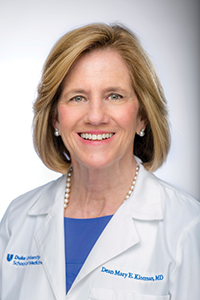Duke University School of Medicine is one of the nation’s leading institutions for health professions and biomedical education, clinical care, biomedical research, and community partnership. The school comprises more than 2,800 regular rank faculty physicians and researchers, over 2,200 students in over 40 health professions and graduate degree programs, and more than 6,000 staff.
Planning for the School of Medicine began nearly a century ago in 1925 when businessman James Buchanan Duke, benefactor of Duke University and The Duke Endowment, bequeathed $4 million to establish the Duke University School of Medicine, as well as the Duke University School of Nursing and Duke University Hospital. Less than five years after the school opened in 1930, the Association of American Medical Colleges (AAMC) ranked Duke in the top quarter of medical schools in the country. In the nearly 100 years since, the School of Medicine has built an international reputation as a world-class academic medical institution.
Duke Health encompasses the world-class academic health care and research of the Duke University Health System, Duke University School of Medicine, Duke University School of Nursing, Duke-NUS Medical School, Duke Global Health Institute, and the Duke-Margolis Institute for Health Policy.
Leadership

Duke University School of Medicine is led by Dean Mary E. Klotman, MD. She also serves as Executive Vice President for Health Affairs for Duke University and Chief Academic Officer for Duke Health. She works with a leadership team comprising 12 vice deans and a chief of staff, as well as department chairs and center and institute directors. Associate and assistant deans also assist the dean with the oversight and management of the School of Medicine.
Departments, Centers, and Institutes
The Duke University School of Medicine comprises 26 clinical and basic science departments. The school’s strong emphasis on research to improve clinical outcomes encourages collaborations among faculty members, departments and other schools at the university, and has resulted in the development of numerous centers and institutes.
Who We Are
At Duke University School of Medicine, we are a dynamic community of scholars, educators, clinicians, scientists, learners, and staff dedicated to advancing health and wellness through education, research, patient care, and community partnership. Established in 1930, we have grown to become one of the nation’s leading medical schools, renowned for its innovative curriculum, cutting-edge research, and commitment to excellence in clinical care.
We are driven by a commitment to improving human health. We achieve this through a unique blend of rigorous academic programs, pioneering scientific discovery, and compassionate patient care.
Central to our mission is a steadfast commitment to respect for and inclusion of people from all backgrounds. These principles are essential to achieving institutional excellence and fostering a vibrant, supportive community where everyone feels welcomed, valued, empowered, and included. The rich variety of backgrounds, interests, experiences, and perspectives that make up the School of Medicine creates an environment in which innovation and excellence thrive.
We are deeply committed to serving our community. Through partnerships with local organizations and global initiatives, we strive to improve access and quality of care for all populations.
Education, research, patient care, and community partnership come together at Duke University School of Medicine to create a healthier world. We are proud of our legacy and excited about the future as we continue to lead in health care education and innovation.
Philanthropy Snapshot
To realize our potential to transform health care, Duke Health is taking part in the ambitious, university-wide MADE FOR THIS campaign that launched early in 2025 to propel innovation, drive discovery, and improve lives around the world. A featured element of the campaign is the Health Innovation Fund, a new internal grant-making fund that aims to raise $100 million to sustain momentum for medical research and innovation.
The campaign highlights the Duke Difference: our outrageous ambition, our strength in interdisciplinary collaboration, our can-do resolve that meets challenges head on with courage and creativity, and our ability to deliver results. Our unique approach makes Duke the best investment to solve the world’s toughest challenges.
Philanthropy provides critical support for Duke University School of Medicine’s success. Gifts, endowments, and investment income constitute nearly 20 percent of the school’s annual revenue and support research, education, patient care, and community partnership.
Our philanthropic partners help us educate the brightest minds, leverage our innovation and expertise to make the next transformative discovery, and say yes to patients when they have nowhere else to turn.

By the Numbers
$151.1 million: New Philanthropic Commitments
$57.7 million: Additional Research Support
$208.8 million: Total FY25 Private Support
- Total Private Support includes commitments from philanthropic donors, such as individuals and foundations, in addition to non-governmental grants that faculty receive to support their research.
$3.75 million: Contributed to School of Medicine Annual Giving
- Annual Giving provides resources to support medical education and training, research, and flexible funds for emerging needs and new opportunities for the Duke University School of Medicine.
$3.5 million: Reunion Giving
Source: Duke Health Development & Alumni Affairs, July 1, 2025
Faculty & Staff Snapshot
Faculty
| Number | Type of Faculty |
|---|---|
| 2,809 | Regular Rank Faculty |
| 265 | Basic Science Faculty |
| 2,520 | Clinical Science Faculty |
| 24 | Other Faculty (in Centers, Institutes, Administration) |
Source: School of Medicine Finance Office, September 2025
School of Medicine Staff and Postdocs
| Number | Type of Staff |
|---|---|
| 6,030 | Staff |
| 370 | Postdocs |
Source: School of Medicine Finance Office, September 2025
Duke University Health System Employees
| Number | Staff |
|---|---|
| 32,254 | Staff |
Source: Duke University Health System, October 2025
Faculty Memberships
Faculty with a primary or secondary appointment in the School of Medicine.
| Number | Type of Membership |
|---|---|
| 1 | Nobel Laureates |
| 1 | Nobel Laureates - Emeriti |
| 24 | American Academy of Arts and Sciences |
| 41 | American Association for the Advancement of Science |
| 64 | American Society for Clinical Investigation |
| 46 | Association of American Physicians |
| 1 | Howard Hughes Freeman Hrabowski Scholar |
| 5 | Howard Hughes Medical Institute investigators |
| 28 | National Academy of Medicine |
| 19 | National Academy of Sciences |
| 215 | Faculty holding distinguished and named professorships |
Source: School of Medicine Finance Office, September 2025
Education & Training Snapshot
The Duke University School of Medicine offers over 40 health professions and graduate degree and certificate programs. These include the Doctor of Medicine program, recognized nationally for its unique patient-centered curriculum; the nation’s first Physician Assistant program; Physical Therapy and Occupational Therapy doctorates; 17 biomedical PhD programs; an innovative Master of Biomedical Sciences, and numerous other master’s degree programs. The School of Medicine also is home to the Medical Scientist Training program which allows students to combine an MD degree with a PhD in the biomedical sciences in partnership with The Graduate School. Duke's Graduate Medical Education includes more than 160 residency and fellowship programs and almost 1,200 trainees.
*All enrollment data is for the academic year 2025-2026
Number of Students Enrolled by Program
Health Professions Degree Programs
513 Doctor of Medicine (MD)
310 Doctor of Physical Therapy (DPT)
185 Physician Assistant (MHS, PA)
158 Master of Health Sciences in Clinical Research
113 Occupational Therapy Doctorate (OTD)
109 Master of Biostatistics
75 Medical Scientist Training Program (MD/PhD)
31 Master of Biomedical Sciences
35 Master of Science in Medical Physics
40 Master of Management in Clinical Informatics
34 Master of Science in Population Health Sciences
15 Pathologists’ Assistant (MHS)
Total Degree Program Students: 1,618
Certificate Programs
15 Ophthalmic Technician Certificate
10 Cardiac Ultrasound Certificate
1 Population Health Sciences Certificate
2 Clinical Informatics Certificate
2 Orthoptic Training Certificate
Total Certificate Program Students: 30
Source: Duke School of Medicine Finance Office, September 2025

Biomedical PhD Programs
33 Biochemistry
34 Biostatistics
87 Cell and Molecular Biology
33 Computational Biology and Bioinformatics
9 Developmental and Stem Cell Biology
61 University Program in Genetics and Genomics
33 Integrative Immunobiology
30 Medical Physics
35 Molecular Cancer Biology
71 Molecular Genetics and Microbiology
64 Neurobiology
31 Pathology
35 Pharmacology
28 Population Health Sciences
2 Integrated Toxicology and Environmental Health Program
10 Cell Biology
9 Medical Scientist Training Program
Total Biomedical PhD Students: 605
Graduate Certificate Programs
Students in these certificate programs may be Biomedical PhD students or graduate students in School of Medicine or other Duke professional schools.
2 Biomedical and Tissue Engineering
19 Cell and Molecular Biology
57 Certificate in College Teaching
32 Developmental and Stem Cell Biology
3 Integrated Toxicology & Environmental Health Program
2 Global Health
57 Innovation and Entrepreneurship
Total Graduate Certificate Program Students: 172
Graduate Medical Education Trainees
1,197 Residents and Fellows
Source: Duke School of Medicine Finance Office, September 2025
Research Snapshot

Duke University School of Medicine is the vibrant home for the next generation of discovery. Our capacity for innovation stems from knitting together our existing strengths in fundamental basic science and deepening our growing translational capabilities, our integration with Duke’s nationally recognized clinical enterprise, Duke University Health System, and our unique scale and depth in clinical research. The combined efforts of the school’s basic and clinical faculty members in departments, centers, and institutes make Duke one of the largest biomedical research enterprises in the country with over $1.2 billion in sponsored research expenditures annually.
By the Numbers
Duke University School of Medicine is proud to claim 2 Nobel Laureates among its faculty.
Over 2 million patients enrolled in more than 2,500 active studies with 3,500 study sites worldwide
In 2024, Duke University School of Medicine received more than $455 million in sponsored research grants from the National Institutes of Health to advance biomedical research, ranking 13th in the country among medical schools, according to the Blue Ridge Institute for Medical Research report.
In 2024, Duke University received more than $580 million in total grants and contracts, including R&D, from the National Institutes of Health, ranking 11th in the country among universities and research institutions, according to the Blue Ridge Institute for Medical Research report.
Patient Care Snapshot

Patient care is an integral part of what makes Duke University School of Medicine a hub for pioneering research and innovation. Every day, our investigators, clinicians, and staff work together to translate research findings from the bench to the bedside, and to learn from patients as we improve their care. This collaborative spirit fuels the translation of scientific discoveries to improve human health locally and around the globe.
Duke University Health System is a world-class hospital and health care network. Duke's services span the full continuum of care, from primary care to medical and surgical specialties and subspecialties, all dedicated to putting our patients at the forefront of everything we do. The health system advances our clinical mission by delivering care across four hospitals (Duke University Hospital, Duke Regional Hospital, Duke Raleigh Hospital, and Duke Health Lake Norman Hospital) and numerous outpatient locations, including Duke Primary Care, Duke Health Integrated Practices, Duke HomeCare & Hospice, and multiple affiliations.
Patients Served
Inpatient Discharges, FY25
| Number | Location |
|---|---|
| 45,882 | Duke University Hospital |
| 17,392 | Duke Regional Hospital |
| 12,527 | Duke Raleigh Hospital |
| 74,702 | Total Duke University Health System combined* |
*Note: Duke Health Lake Norman data not available for reporting.
Outpatient Visits, FY25
| Number | Location |
|---|---|
| 964,109 | Duke University Hospital |
| 75,180 | Duke Regional Hospital |
| 192,547 | Duke Raleigh Hospital |
| 1,116,333 | Duke Primary Care |
| 1,531,863 | Duke Health Integrated Practice (DHIP) |
| 3,880,032 | Total Duke University Health System |
Source: Duke University Health System, October 2025
Community Partnership Snapshot
Duke University School of Medicine is committed to serving others in the local community and beyond and has expanded its reach to involve the community in all its missions, including patient care, educational programs, and research initiatives. We partner with numerous community organizations to improve health care and address social drivers of health among our neighbors in Durham and across North Carolina. Our community partnerships include:
-
Durham Early College of Health Sciences, a partnership between Durham Public Schools, Durham Technical Community College, and Duke, which offers local high school students educational and employment pathways to health professions careers at Duke Health.
-
Wellness centers providing medical and mental health services in four Durham public schools.
-
Primary care, case management, and therapeutic services for elderly and disabled individuals in 13 senior housing sites.
-
Extending world-class care to more communities across the state through the launch of Duke Health Lake Norman Hospital, expansion of Duke Health Cary, and collaborations with other partners.
By the Numbers
$1.021 billion: Community health benefit and investment, FY24
Duke University Health System contributed a total of $1.021 billion to benefit communities across North Carolina
$175 million: Financial assistance for patients
Duke’s commitment to its patients ensures that patients with financial hardships receive the care they need
457,946: Patients receiving financial assistance
$15 million: Supporting the work of community groups
Duke provided more than $15 million in cash and in-kind support for community groups to help eliminate health care disparities and improve access to high-quality medical care, including:
-
$10 million for Lincoln Community Health Center and its satellite community clinics, which serve a majority of uninsured patients with incomes below the poverty line.
-
$3 million for Durham County’s Emergency Medical Services program
-
$2 million in cash contributions to other community organizations
$86 million: Investment in health professions education
Educating the next generation of physicians, nurses, physician assistants, physical therapists, and other health professionals is central to Duke’s mission to improve health care for patients and the communities we serve.
423: Patient care locations
Duke University Health System has more than 400 clinics and care locations serving North Carolina communities.
Source: Office of Community Health, Duke Health, August 2025
Alumni Snapshot
Almost 14,000 health professions alumni from Duke University School of Medicine span across the country and world, with the largest contingents located in North Carolina, California, and Florida. School of Medicine alumni provide critical philanthropic support for the School of Medicine research and education missions, including financial assistance for students and funding for research initiatives and endowed professorships. The Duke Medical Alumni Association supports and promotes the interests of the Duke University School of Medicine and its extended community and nurtures lifelong relationships and learning.
Health Professions Education Program Alumni (Living)
6155 Doctor of Medicine (MD)
375 Medical Scientist Training Program (MD/PhD)
2309 Doctor of Physical Therapy Program (DPT)
81 Occupational Therapy Doctorate (OTD)
3011 Physician Assistant Program (MHS, PA)
109 Pathologists’ Assistant Program (MHS)
24 Clinical Leadership (MHS)
731 Clinical Research Training Program (MHS)
419 Master of Biomedical Sciences
383 Master of Biostatistics
414 Master of Management in Clinical Informatics
298 Master of Science in Medical Physics
44 Master of Science in Population Health Sciences
Total Living Alumni: 13,793
Source: Duke Medical Alumni Association, August 2025
Global Impact Snapshot
Duke University School of Medicine's global impact is driven by its extensive research, educational programs, and clinical partnerships in global health. Our faculty, staff, and students collaborate with partners worldwide through numerous research and educational initiatives and programs.
The Duke Global Health Institute (DGHI) brings together knowledge and resources from across the university to address today’s most important global health issues. Faculty, staff, and students are engaged in collaborative research with partners in more than 40 countries, as well as communities in the United States, to improve access to health care and address disparities in health outcomes. DGHI researchers are at the forefront of work to identify emerging infectious diseases and new pandemic threats, as well as cutting-edge research addressing the global rise in non-communicable diseases, access to mental health, and the health impacts of climate and environmental change.
Founded in 2005 through collaboration between Duke University and the National University of Singapore, Duke-NUS Medical School stands as Singapore’s only graduate-entry medical school. Guided by a mission to transform medicine and improve lives, Duke-NUS is dedicated to equipping clinical innovators and leaders with the skills needed to navigate the complex landscape of global health care.
By the Numbers
Duke Global Health Institute
- 94 core and 76 affiliate faculty members
- 53 percent of DGHI faculty members are from the School of Medicine
- 04 active research grants in FY25
- 45.5 million in annual external research funding in FY25
- DGHI faculty have active research projects in 49 countries
- DGHI faculty were authors on 879 scholarly publications in 2024-25
- DGHI enrolls 326 students in global health education programs at all levels (undergraduate, master’s, doctoral and medical programs)
- 9 students participated in global health research during summer 2025, working with partners in 15 countries, including the United States
- Since 2019, DGHI has hosted 57 visiting scholars from partner institutions in 14 countries to spark professional development, collaborative research, and bilateral exchange.
Source: Duke Global Health Institute, September 2025
Duke-NUS Medical School
- 2,700+ faculty in research and education
- 5,200+ papers published in international peer-reviewed journals
- 9 active start-up companies by Duke-NUS investigators
- 5 current Singapore Translational Research (STaR) investigators
- 308 patents filed
Source: Duke-NUS, September 2025